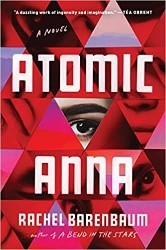Rachel Barenbaum’s new novel, Atomic Anna, begins with the 1986 meltdown of Chernobyl, where the main character, the Jewish scientist Anna Berkova, instantly leaps into the future at the exact moment of the catastrophic explosion at the nuclear power point. From this moment forward, the novel bounces between space and time with the help of Anna’s time machine. Each chapter revolves around the relationships between Anna Berkova, her daughter Molly, and her granddaughter Raisa, all of whom have the intellect and creativity to alter events of the past and change the future — both their personal trajectories as well as the mass tragedy at Chernobyl.
This novel is about the impact that small decisions can have on the lives of many, how one decision, conversation, or action can have a ripple effect and impact generations. At the center of the story, Anna Berkova obsesses over the details of science and engineering and struggles to gain respect in a male-dominated field in the Soviet Union. During the 1930s and 1940s, she had to hide her Jewish identity at a time when Jews were being arrested and deported left and right. Anna unexpectedly becomes pregnant in her early forties, and the story of how her daughter Molly ends up being raised by Anna’s friends, Lazar and Yulia, a Jewish couple from Anna’s past, is revealed over the course of the novel; Lazar and Yulia strive for a better life for themselves and Molly in America.
The novel rotates between Anna, Molly, and Raisa’s perspectives. Molly is a budding comic artist, but when she is in her late teens in Philadelphia, she succumbs to drug and alcohol addiction and becomes unexpectedly pregnant with a daughter, Raisa. Yulia and Lazar struggle to help Molly improve her life as their dreams of success in America crumble around them. Using her time machine, Anna appears at seemingly random moments to provide urgent, discrete messages about changing their lives and warning them about Chernobyl, a tragedy that she aims to prevent. Yulia is frustrated by the fact that when Anna appears from the future, she seems to care more about stopping Chernobyl than saving her own family, as Molly is falling deeper and deeper into drugs and despair. As Raisa grows, readers learn that she is the mathematical genius of the family, and a scholarship opportunity at the University of Pennsylvania helps pave her way to find the answers Anna is looking for.
Each leap into time causes Anna to relearn her current timeline, as her life changes in sometimes drastic ways each time she returns to the future. Time travel makes her body and mind ill; life feels like a big puzzle, and Anna must use Molly and Raisa’s knowledge to help her achieve her goals in real time and in the past.
Anna eventually realizes that she cannot stop Chernobyl without focusing on saving her family first. However, this proves more difficult than it sounds, and it includes multiple trips through the time machine. Anna sneaks notes into Molly’s stunning comic books for Raisa to find, where the female superheroes — Rocket Raisa, Atomic Anna, and Mighty Minerva — give her clues about time travel, electromagnetism, and gravity.
Atomic Anna traverses the twentieth century; chapters move through time from the 1930s to the 1980s and 1990s. Traveling across time, readers experience the connectedness of the women in Anna’s life and how their knowledge, love, and collaboration are their superpowers.
Jamie Wendt is the author of the poetry collection Laughing in Yiddish (Broadstone Books, 2025), which was a finalist for the 2022 Philip Levine Prize in Poetry. Her first book, Fruit of the Earth (Main Street Rag, 2018), won the 2019 National Federation of Press Women Book Award in Poetry. Her poems and essays have been published in various literary journals and anthologies, including Feminine Rising, Catamaran, Lilith, Jet Fuel Review, the Forward, Minyan Magazine, and others. She contributes book reviews to the Jewish Book Council. She won third prize in the 2024 Reuben Rose Poetry Competition and won second prize for the 2024 Holloway Free Verse Award through the Illinois State Poetry Society. Wendt holds an MFA in Creative Writing from the University of Nebraska Omaha. She lives in Chicago with her husband and two kids. Follow her online at https://jamie-wendt.com/ or on Instagram @jamiewendtpoet.


